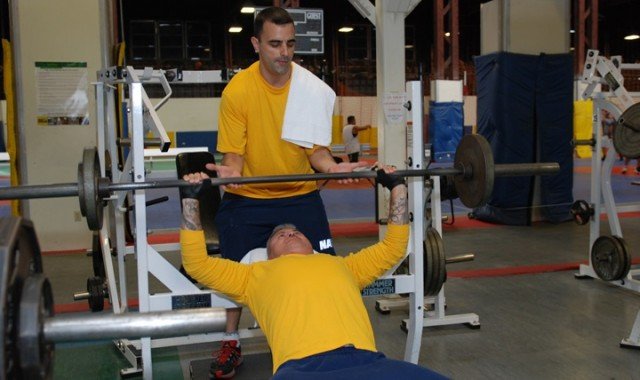
By Military Health System Communications Office
For many people, the start of a new year means making the resolution to get in better shape and maintain a healthy lifestyle. This may also include going to a local gym or signing up for a health club membership. There are however, potential health risks at these facilities.
“Most injuries that are related to workouts are chronic injuries,” said Army Maj. Jesse DeLuca, a sports medicine specialist at Fort Belvoir Community Hospital in Fort Belvoir, Virginia. “From dropping weights on your feet, to pulled muscles, these are the things that occur most often.”
DeLuca suggests for those who are starting a new regimen, start off slow, and establish a routine that you will be able to perform on a consistent basis. “Listen to your body,” he said. “And don’t try to jump into a workout that’s going to be too demanding on you physically. You may end up injuring yourself, and negate any progress you’ve made. Start slow, and go slow in the beginning. I know, with it being the new year, every wants to go hard. However, high-intensity workouts can lower your immune system, and make some more vulnerable to colds, flu and other infection.”
Keeping your workout gear clean is another helpful tip from DeLuca. “Change the towel that you use every day, because it can be a source of infection,” he said. “Always make sure you spray inside your gym bag when you’re carrying those gym clothes to and from workout facilities. Lysol or any type of disinfectant is good. Also, do not share equipment, because that’s a good way to spread germs and infection. And it’s always good gym etiquette to wipe down any equipment or machines you use in the gym afterward.”
DeLuca also suggests wearing shower shoes when taking a shower, or when you’re not wearing gym shoes or regular shoes. “Whether it’s a tile or carpeted surface, it’s always good to have on some type of footwear, because you have people coming in from outdoors, or other areas of the gym that may be more susceptible to germs that can be transferred from the bottom of shoes onto floor surfaces. I would also recommend making sure you wipe your shower shoes after using them, to make sure they’re dry, and drying your feet before putting on socks and other shoes.”
When it comes to diet and nutrition, DeLuca says you have to break it down into two categories: performance measures and/or medical purposes. “If you have diabetes or high blood pressure, consult with your physician so he/she can help set guidelines, and make you aware of any risk factors,” he said. “With regard to performance, it all depends on how your body metabolizes food. Some people are able to consume a light meal before a workout, while others are able to eat a heavy meal. In addition, if you want to restore your muscle health in a relatively short period of time after a workout, you don’t have to do anything fancy; a glass of chocolate milk is capable of restoring glycogens.”
DeLuca also urges people to be sure to consume plenty of fluids while working out. “Keeping your body hydrated is very important, even in the winter,” he said. “You don’t have to drink gallons of water, however, when you do feel thirsty, be sure to replenish the fluids in your body. This will help optimize your performance, and go a long way toward helping you accomplish your fitness goals.”
